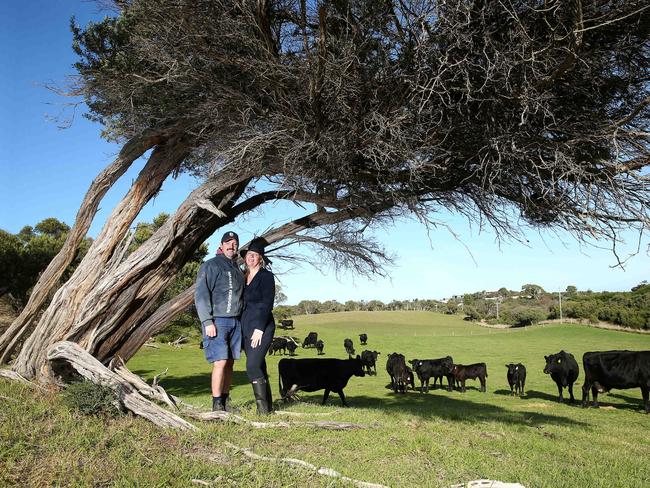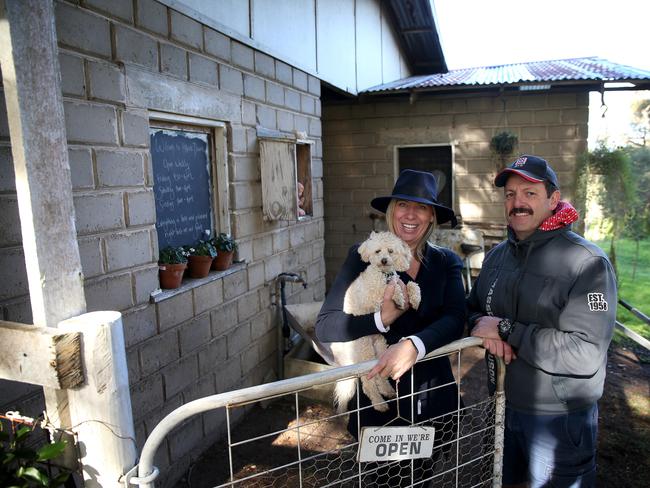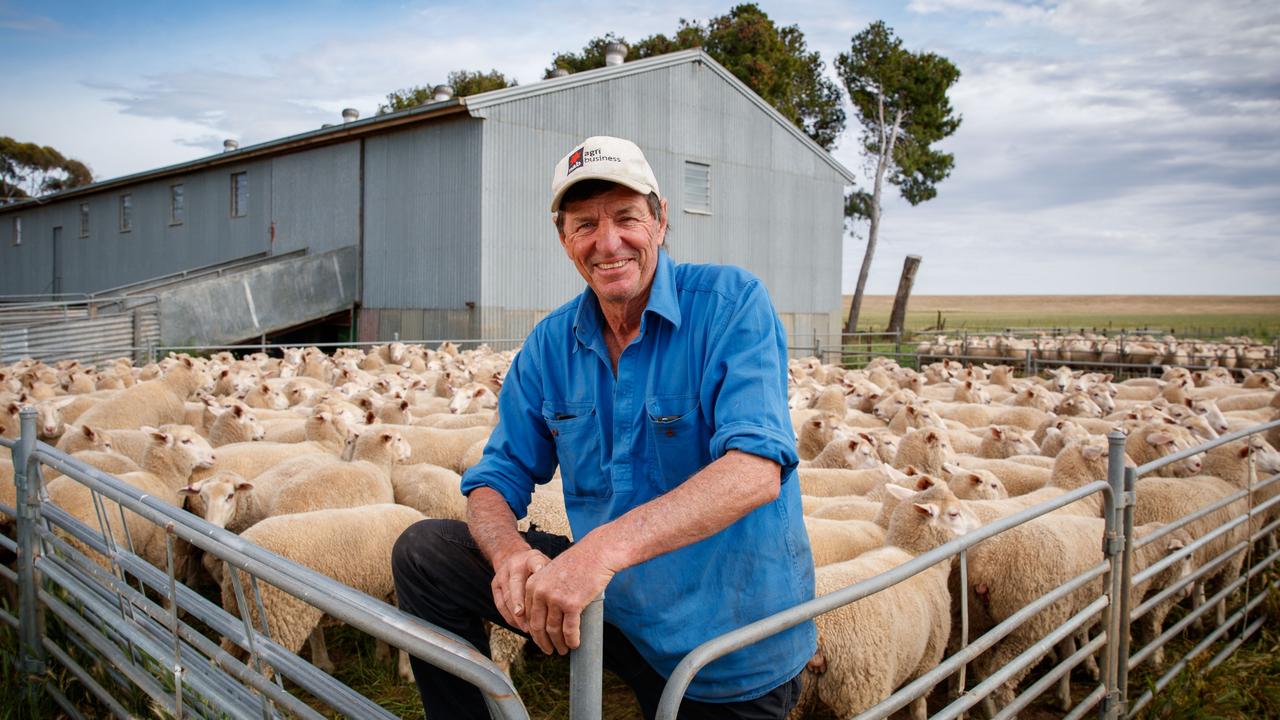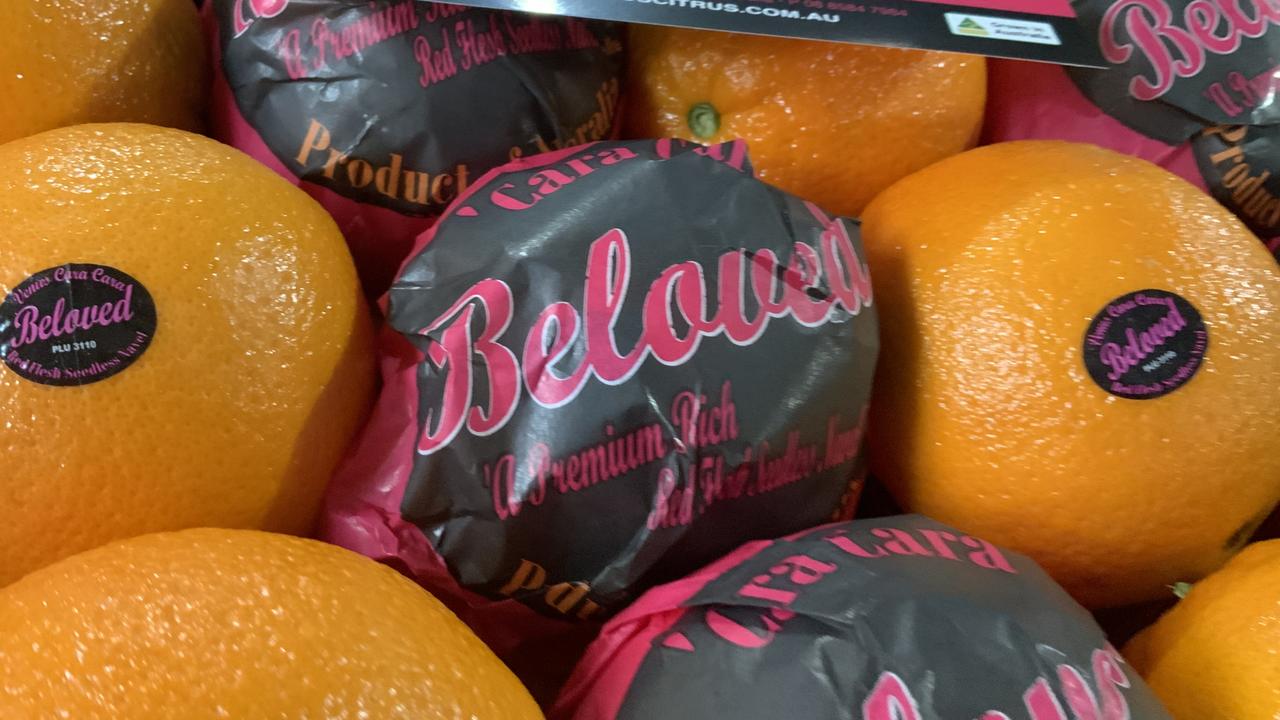Farming on the Mornington Peninsula for the love of their land
A SMALL Mornington Peninsula farm stands out as a beacon amid creeping suburbia, writes SARAH HUDSON.

EDDIE and Sally Matt are well aware their 40ha farm on the Mornington Peninsula would be worth a squillion dollars if subdivided into housing.
“As a former real estate agent and now a farmer I know both sides of the scenario,” said Eddie, who is the president of the Mornington Peninsula chapter of the Victorian Farmers Federation.
MORE LIKE THIS: REIGN AND SHINE FOR 2017 FARMER OF THE YEAR
“But I firmly believe if everyone was on the same page we would never lose a square metre of farmland to housing again.
“Does anyone ever think for one second how many tonnes per hectare of yield we lose to housing and how much each house needs to sustain themselves?
“Has anyone ever run the figures on that before we carve up high-yielding land?
“It’s a disgrace to put houses on productive land.”
EDDIE AND SALLY MATT
HILLOCK DOWNS
RUN 45 Angus-Friesian breeding cows and grow a variety of vegetables on 40ha
BRANDED meat and farm produce was introduced four years ago
RUN a farm produce store out of their old renovated dairy
ABOUT two calves a week are slaughtered for veal
Green-wedge issues are close to Eddie’s heart, not least because the north boundary of his property at Rye borders the urban fringe.
For Eddie and Sally, their Hillock Downs property is a poster child for why it is important to provide local food to local communities, underscoring why he supports a boundary to Melbourne’s growth.
“We are literally on the doorstep of suburbia and we supply food at our farm gate that doesn’t need to be transported,” Eddie said.
“Like the Yarra Valley or other interface areas, we have highly productive, valuable real estate, which has close access to markets and an abundance of water, which means we are feeding our communities.”
FRONT AND CENTRE
THE Matt family run their Hillock Downs farm produce store out of their renovated old dairy shed (circa 1943), open Fridays, Saturdays and Sundays, which is 10 metres from the main road that runs past their farm.

All their farm produce is sold out of the shed, including veal from their herd of 45 Angus-Friesian breeders, as well as vegetables from their 0.2ha kitchen garden, along with honeycomb from their five bee hives.
The farm — part of an original larger property — was bought by Eddie’s parents in 1975 and for a time was run as a Murray Grey stud.
For the past nine years it has been run by Eddie and Sally, with the branded meat and farm produce introduced four years ago.
Eddie buys two-year-old Angus-Friesian cows in calf from private sales, then keeps those cows as breeding stock for up to 15 years.
Cows are joined with a Limousin bull (called Red) year-round to ensure a constant supply of calves.
“It means I have to go through a bit of a rigmarole, managing the bull and introducing him to new cows. It’s hard work but it’s about making the best of the farm operation,” said the 49-year-old.
He aims for quality European beef genetics, but with the good milk supply of a Friesian.
GRASS ACT
THE herd is fed on pastures of kikuyu, couch, rye and clover, while Eddie also grows lucerne, selling excess hay to farmers.
Pastures are soil-tested to determine nutrient needs, but are otherwise low input. Eddie said he used to spray for lucerne fleas and red-legged earth mites, but he now sees no need and leaves it to the birds to eat the bugs.
About 20ha of pasture are irrigated from groundwater, while the sandy soil farm also receives an average annual rainfall of about 800mm.
Calves are not weaned and stay on their mothers until ready for processing at age nine to 12 months, or 400kg-plus liveweight.
About two calves a week are transported to Gathercole’s abattoir in Carrum Downs, then taken to a butcher in Koo Wee Rup, where the meat is boned into traditional cuts, packaged into branded cryovac bags and then all sold in the farm shop.
“Every animal born on the farm is sold on the farm,” he says.
“We looked at selling online and at farmers’ markets but it simply wasn’t worth it. Here we’re on small acreage surrounded by shoppers who want fresh produce and we’re near a golf course, hot springs wellness centre and brewery, so a major tourist area.”
Eddie said they looked at selling quarter and half carcasses to customers, but given their trade is such a short distance away, “the feedback was that people wanted fresh cuts and they were happy to come here each week and buy it”.
HAY THERE
LIKE the pastures, the vegetable patch has low inputs, so low Eddie applies no fertiliser, just the occasional layer of lucerne, which acts as mulch, providing nutrients and stops weeds.
“We don’t have any pest or disease problems and we hand weed. Sometimes I’ll get a bit of chicken manure from the neighbour,” Eddie said.
Crops are seasonal and include dozens of varieties, such as tomatoes, zucchinis, cucumbers, pumpkins, potatoes and corn.
Sally also preserves olives and vegetables, also sold through the farm shop, alongside her passata sauce.
As for the bees, Eddie is not sure of yields: “We just cut off honeycomb and sell it through the shop when it’s ready. We don’t even measure it.”
He said because there were so few farms left on the Mornington Peninsula, he has bought all his own equipment and did all farm work himself.
“A lot of the agricultural knowledge down here has been lost. There used to be contractors who’d drive their own 135 Massey Fergusons about — with no cab or aircon — but that doesn’t happen much now,” he said
It’s a source of pride and joy for Eddie to be one of the last handful of farmers on the peninsula.
“There’s nothing better than being able to work for yourself from home in a place like this, to grow the lucerne, to feed to the animals and then sell them on the farm. I don’t know what other job you can do that,” he said.
• If you know someone who deserves to be recognised as an outstanding farmer, let us know


